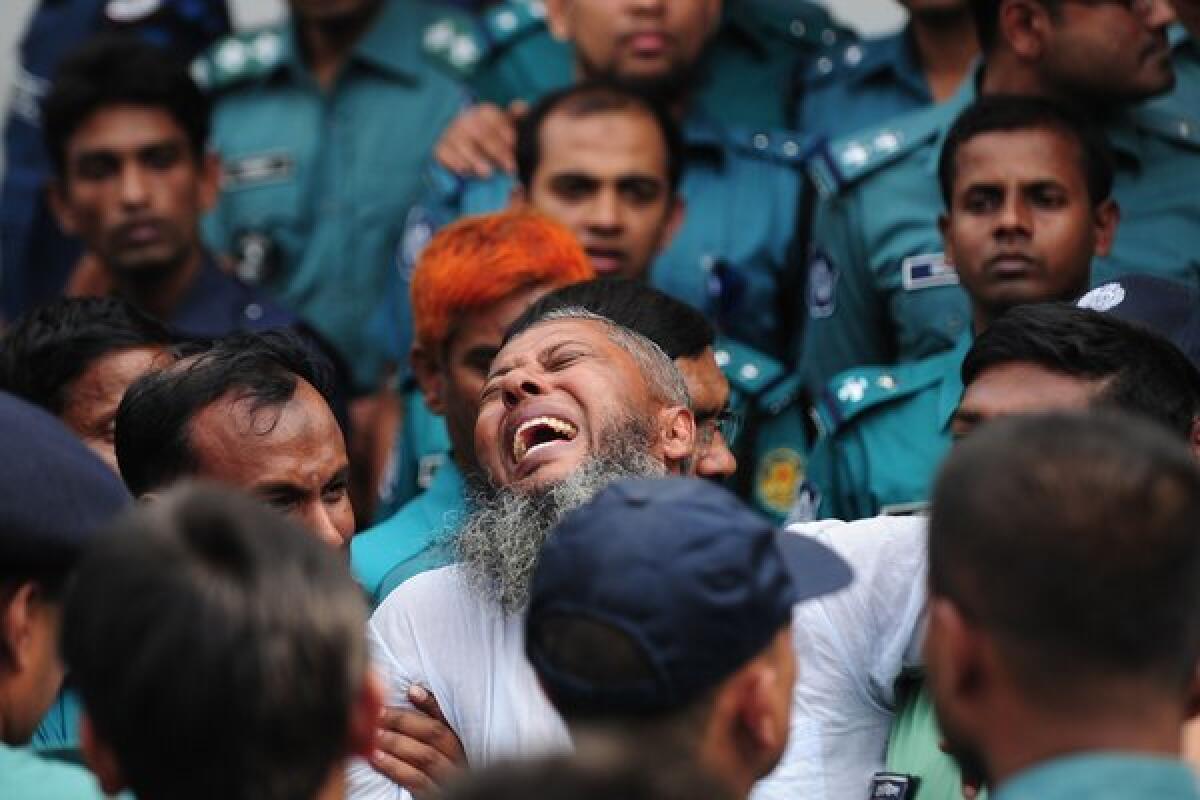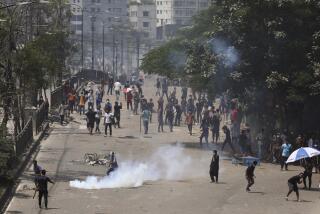Bangladesh sentences 152 former soldiers to death for mutiny killings

NEW DELHI -- In a trial dubbed one of the world’s largest, a special court in Bangladesh handed down the death penalty Tuesday to 152 ex-paramilitary soldiers for the killing of dozens of people during a 2009 mutiny.
“They will be hanged by neck until they are dead,” Judge Mohammed Akhtaruzzaman told those packed into specially constructed court chambers in the capital, Dhaka. “The atrocities were so heinous that even the dead bodies were not given their rights.”
Of the 846 accused of killing 74 people during the February 2009 mutiny, 161 were handed life sentences, over 250 received prison terms of up to 10 years and over 270 were acquitted. Several of the accused also received fines for looting, trespassing, hiding bodies and unlawful assembly.
The massive trial, held under heavy security, included about 10,000 pages of depositions taken from more than 650 witnesses. More than 1,000 police officers and members of the elite Rapid Action Battalion guarded the court complex.
“It is possibly one of the biggest criminal trials in the world in terms of the number of accused, witnesses testified and the people killed,” chief prosecutor Anisul Huq said during the trial.
Several attorneys representing the accused said their clients planned to appeal. “We did not get justice,” defense lawyer Shamim Sardar told reporters after the sentences were announced. “We’ll move [to petition] the higher court against the verdict.”
Prosecutors also were reportedly considering appeals in connection with those who were acquitted.
Some observers bridled at the wholesale nature of the justice handed down.
“We think this penalty to more than 150 people is a bit shocking,” said Sultana Kamal, executive director of Dhaka-based Ain O Salish Kendra, a human rights organization. The group will consider an appeal for one defendant it represented, who received a 10-year sentence, after it sees the verdict, she said.
The mutiny reportedly broke out when a senior official with the paramilitary Border Guard Bangladesh -- then known as the Bangladesh Rifles -- was giving a speech at a ceremonial function and his subordinates tried to take him hostage. The rebellion quickly spread to regional units as members of the paramilitary force attacked officers’ quarters, killing 57 army officials and over a dozen of their family members and staff.
Beyond the killing spree, the mutineers looted arms and ammunition from armories, stole valuables from officers’ homes, held officers’ families hostage at gunpoint and dumped victims’ bodies in sewers and shallow graves, officials said. The then-head of the approximately 48,000-member paramilitary force was among those killed.
The country’s handling of the trials -- which lasted from January 2011 until last month -- has elicited criticism from rights groups including New York-based Human Rights Watch, which has accused the government of questionable judicial standards in the massive trial. The government has denied any wrongdoing.
The mutiny was reportedly fueled by resentment among border guards who felt they didn’t receive the respect, pay or benefits enjoyed by their army counterparts. Judge Akhtaruzzaman said in comments accompanying the verdict that a key cause of the revolt was grievances over the different facilities afforded army and border guards.
“It also aimed to tarnish the image of the army in the outside world, where it has built up a reputation in performing U.N. peacekeeping duties,” he added.
The 33-hour standoff ended when the mutineers surrendered. Twenty more accused remain at large, and four died during the trial.
Other trials on mutiny charges were held against 6,046 border guard members, resulting in the sentencing of nearly 6,000 to jail sentences of up to seven years.
The border force was established in 1795 under the command of Britain’s East India Company and enjoys a long, distinguished history. After the revolt, the name of the Bangladesh Rifles was changed to the Border Guard Bangladesh, and the force was revamped with new uniforms and a new structure in a bid to overcome the mutiny stigma.
ALSO:
Syrian government forces advance against rebels
Trove of paintings has works looted by Nazis, masterpieces
Iran may be lowering expectations for next round of nuclear talks
Twitter: @markmagnier
Tanvi Sharma in the New Delhi bureau contributed to this report.
More to Read
Sign up for Essential California
The most important California stories and recommendations in your inbox every morning.
You may occasionally receive promotional content from the Los Angeles Times.










